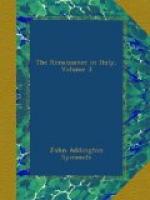The next is saddened by old age and death. Love has yielded to piety, and is only remembered as what used to be. Yet in form and feeling this is quite one of the most beautiful in the series supposed to refer to Vittoria Colonna:[425]—
TORNAMI AL TEMPO
Bring back the time when blind
desire ran free,
With bit and rein
too loose to curb his flight;
Give back the
buried face, once angel-bright,
That hides in earth all comely
things from me;
Bring back those journeys
ta’en so toilsomely,
So toilsome-slow
to him whose hairs are white;
Those tears and
flames that in one breast unite;
If thou wilt once more take
thy fill of me!
Yet Love! Suppose it
true that thou dost thrive
Only on bitter
honey-dews of tears,
Small profit hast
thou of a weak old man.
My soul that toward the other
shore doth strive,
Wards off thy
darts with shafts of holier fears;
And fire feeds
ill on brands no breath can fan.
After this it only remains to quote the celebrated sonnet used by Varchi for his dissertation, the best known of all Michael Angelo’s poems.[426] The thought is this: just as a sculptor hews from a block of marble the form that lies concealed within, so the lover has to extract from his lady’s heart the life or death of his soul,
NON HA L’OTTIMO ARTISTA
The best of artists hath no
thought to show
Which the rough
stone in its superfluous shell
Doth not include:
to break the marble spell
Is all the hand that serves
the brain can do.
The ill I shun, the good I
seek, even so
In thee, fair
lady, proud, ineffable,
Lies hidden:
but the art I wield so well
Works adverse to my wish,
and lays me low.
Therefore not love, nor thy
transcendent face,
Nor cruelty, nor
fortune, nor disdain,
Cause my mischance,
nor fate, nor destiny:
Since in thy heart thou carriest
death and grace
Enclosed together,
and my worthless brain
Can draw forth
only death to feed on me.
The fire of youth was not extinct, we feel, after reading these last sonnets. There is, indeed, an almost pathetic intensity of passion in the recurrence of Michael Angelo’s thoughts to a sublime love on the verge of the grave. Not less important in their bearing on his state of feeling are the sonnets addressed to Cavalieri; and though his modern editor shrinks from putting a literal interpretation upon them, I am convinced that we must accept them simply as an expression of the artist’s homage for the worth and beauty of an excellent young man. The two sonnets I intend to quote next[427] were written, according to Varchi’s direct testimony, for Tommaso Cavalieri, “in whom”—the words are Varchi’s—“I discovered,




